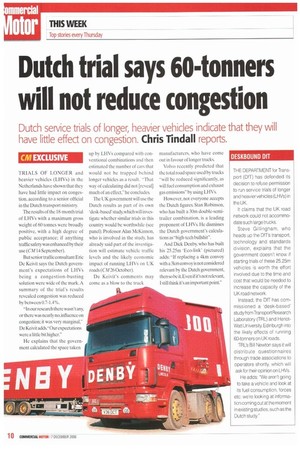Dutch trial says 60-tonners will not reduce congestion
Page 10

If you've noticed an error in this article please click here to report it so we can fix it.
Dutch service trials of longer, heavier vehicles indicate that they will have little effect on congestion. Chris Tindall reports.
CM EXCLUSIVE TRIALS OF LONGER and heavier vehicles (LHVs) in the Netherlands have shown that they have had little impact on congestion. according to a senior official in the Dutch transport ministry.
The results of the 18-month trial of LHVs with a maximum gross weight of 60 tonnes were broadly positive, with a high degree of public acceptance; if anything traffic safety was enhanced by their use (CM 14 September).
But senior traffic consultant Eric De Keivit says the Dutch government's expectations of LHVs being a congestion-busting solution were wide of the mark. A summary of the trial's results revealed congestion was reduced by between 0.7-1.4%.
"In our research there wasn't an or there was nearly no, influence on congestion; it was very marginal," De Keivit adds."Our expectations were a little bit higher."
He explains that the government calculated the space taken up by LI IVs compared with conventional combinations and then estimated the number of cars that would not he trapped behind longer vehicles as a result. "That way of calculating did not [reveal] much of an effect," he concludes The UK government will use the Dutch results as part of its own 'desk-based' study,which will investigate whether similar trials in this country would be worthwhile (see panel). Professor Alan McKinnon, who is involved in the study. has already said part of the investigation will estimate vehicle traffic levels and the likely economic impact of running LHVs on UK roads (CM 26 October), De Keivit's comments may come as a blow to the truck manufacturers. who have come out in favour of longer trucks Volvo recently predicted that the total road space used by trucks "will be reduced significantly, as will fuel consumption and exhaust gas emissions" by using LHVs.
However, not everyone accepts the Dutch figures. Stan Robinson, who has built a 30m double-semitrailer combination, is a leading proponent of LHVs. He dismisses the Dutch government's calculations as "high-tech bullshit".
And Dick Denby. who has built his 25.25m 'Eco-link' (pictured) adds: "If replacing a 4km convoy with a 3km convoy is not considered relevant by the Dutch government, then so be it. Even if it's not relevant, I still think it's an important point."
DESKBOUND 011
THE DEPARTMENT for Transport (DfT) has defended its decision to refuse permission to run service trials of longer and heavier vehicles (LHVs) in the UK.
It claims that the UK road network could not accommodate such large trucks.
Steve Gillingham, who heads up the DfT's transport, technology and standards division, explains that the government doesn't know if starting trials of these 25.25m vehicles is worth the effort involved due to the time and cost that would be needed to increase the capacity of the UK road network.
Instead, the DfT has commissioned a 'desk-based' study from Transport Research Laboratory (TRL) and HeriotWatt University. Edinburgh into the likely effects of running 60-tonners on UK roads.
TRL's Bill Newton says it will distribute questionnaires through trade associations to operators shortly, which will ask for their opinion on LHVs. He adds: "We aren't going to take a vehicle and look at its fuel consumption, forces etc: we're looking at information coming out at the moment in existing studies, such as the Dutch study."


































































































































































































